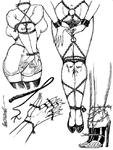You're confusing work and conflict. Because, as you say, males are expendable, from insects all the way up to higher mammals nature has given males extra handicaps so they can be tested to destruction to improve the breed. Some of these handicaps are exotic, like the peacock's tail or the fiddler crab's claw, but usually it's simply extra aggression so they pick fights with other males or predators. (This is why human male aggression peaks before 30; if they survive that long, they're proved fit to mate and settle down.)
But until the Agricultural Revolution, work wasn't a danger to life. A hunter might get gored or trampled by his prey, but so could a gatherer get taken by a leopard; hunter-gatherers generally lived long relatively easy lives. Agriculture introduced a life of work that wore people down till they died early, but the women who tended livestock, ground corn, cut and preserved meat and all the other tasks around the home worked as long and hard as the men in the fields. There is a whole body of peasant folk songs and tales about the husband and wife who try swapping jobs, and they all end with the man admitting that his wife's work is harder.
The glorification of men's work has less to do with practical realities and more to do with cultural politics. Men who had nothing else to feel proud of, serfs and industrial and administrative wage-slaves, needed to build up their self-worth as the master of the house, the provider for the little woman at home; and it gained traction in the suburban culture where women's work was simplified down to the basic menial tasks. But the myth that this is the natural order of things is just that, a myth.
Welcome to the BDSM Library.
Results 1 to 9 of 9
Thread: man the provider
Threaded View
-
10-11-2017 #8
Re: man the provider
Leo9
Oh better far to live and die under the brave black flag I fly,
Than play a sanctimonious part with a pirate head and a pirate heart.
www.silveandsteel.co.uk
www.bertramfox.com
Thread Information
Users Browsing this Thread
There are currently 1 users browsing this thread. (0 members and 1 guests)
 Members who have read this thread: 0
Members who have read this thread: 0
There are no members to list at the moment.







 Reply With Quote
Reply With Quote